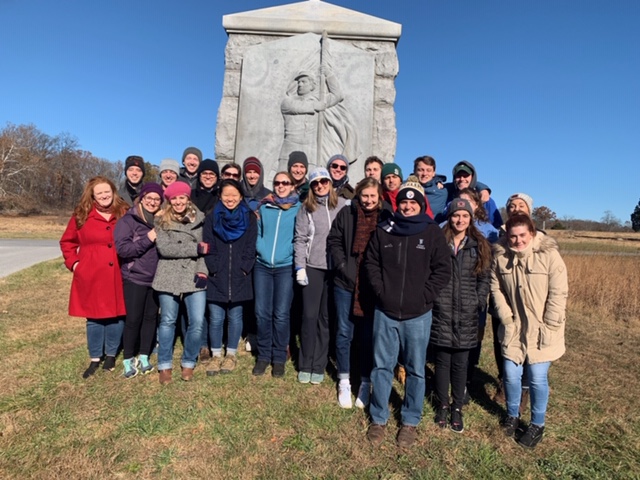
By Joshua Waechter and Krystina Skurk
Just before Remembrance Day, the Saturday closest to the day Abraham Lincoln gave the Gettysburg Address, Hillsdale’s WHIP (Washington Hillsdale Internship Program) students participated in a field study of the Battle of Gettysburg.
The group, made up of Hillsdale students, alumni, and Hillsdale in D.C. staff members, first went to Gettysburg College where they listened to a lecture by Historian Allen Guelzo. Dr. Guelzo is the leading authority on the Civil War, Reconstruction, and President Abraham Lincoln. He is also the three-time winner of the Lincoln Prize and the director of the Civil War Studies Era at Gettysburg College.
Dr. Guelzo’s lecture focused on why Gettysburg was such an important battle. According to Dr. Guelzo, Gettysburg was the battle that decided the fate of the Civil War. “After Gettysburg the sun never shone for the South again,” he said. Though not completely defeated as Lincoln had hoped it would be, General Lee’s Army of Northern Virginia was forced on the defensive for the remaining 21 months of the war.
Dr. Guelzo explained that the results of the battle were catastrophic for the South and not just because the Rebels suffered massive casualties. According to him, it is likely that one-third of each army was either killed or wounded. For the South especially, this included high casualties within the army’s chain of command. Of the 52 generals, one-third were killed. In one regiment with 31 officers, 29 were killed or wounded. These officers and general could be replaced, but their years of experience could not.
Dr. Guelzo said that if the North had lost this battle it would have likely been their last defeat. It would have crippled the Union and forced the Lincoln Administration to sue for peace.
Abraham Lincoln translated the raw experience of battle into an anthem of democracy, Dr. Guelzo said of the Gettysburg Address. He argued that the Civil War tested whether a democracy of ideals could survive. Dr. Guelzo stated,
“Gettysburg, with its dead, was proof that there was a great many...people who were willing to make the ultimate sacrifice to preserve the integrity of their nation and the right to self-government and the propositions around which it was built.”
The tour of the battlefield was led by a licensed Battle Field Guide and consisted of visiting key locations on the battlefield in order to discuss the most important parts of the bloody three-day contest. “The tour guide was very engaging and knowledgeable and I was surprised to see how all the monuments stretch across the countryside,” said senior Ella Williams.
According to senior, Hannah Johnson, “Seeing the battlefield in person is the only way to truly appreciate the magnitude of the events at Gettysburg. The staff did a wonderful job of bringing that history to life.”
“Our trip to Gettysburg was incredibly interesting. It was remarkable to walk the land that was once the sight of such an impactful moment in our nation’s history,” said junior Aidan Wheeler.
One of the first stops on the tour of the battlefield was Cemetery Hill. This was the lynch-point of the entire battle. Cemetery Hill was the primary Union position which the Confederates focused their effort on capturing.
Next the students went to McPherson’s Ridge. This is where Hillsdale men, serving in Michigan regiments as part of the vaunted Iron Brigade, fought to the point of annihilation trying to hold back the Confederates. Here the guide used volunteers to demonstrate different battle strategies.
The atmosphere was solemn as students toured the Wheatfield, or the “Whirlpool of Death,” which the guide said was the bloodiest patch of ground in North America. This is the place where Hillsdale men serving in the 4th Michigan fought. Their commander, Colonel Harrison Jeffords, was the highest-ranking officer to be bayoneted during the Civil War. He died saving the regimental colors.
Reflecting on the trip, senior Julia Huebner said,
“We were fortunate to have beautiful weather for our trip to Gettysburg. While the battlefield certainly had an extraordinary amount of historical significance and allowed us to see what the Civil War soldiers saw as they fought, I also thoroughly enjoyed walking around the town and imagining what life would’ve been like as a civilian during this tumultuous period of American history.”
The 2019 WHIP Expedition to Gettysburg enabled the students and staff alike to spend some time away from a capital gripped in the throes of partisan politics in order to contemplate the higher goods of courage, sacrifice, and patriotism. According to junior, Emmanuella Cummins:
“The trip to Gettysburg illuminated the greater purpose of my WHIP experience, which is to say that my respect for our history and our great men grew. Going to the actual battlefield, reading about Lincoln's statesmanship in Dr. Spalding's class, and visiting the Lincoln monument all inspired an awe and wonder that I didn't have before coming to study here. Our shared history and narrative of what makes America came in full focus while on WHIP and on the Gettysburg trip.”
The students left the battlefield back to the nation’s capital with the words of Lincoln’s Gettysburg Address ringing in their ears:
“[F]rom these honored dead we take increased devotion to that cause for which they gave the last full measure of devotion…that government of the people, by the people, for the people, shall not perish from the earth.”